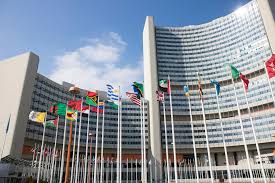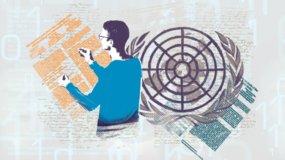The world is changing and so is transnational organized crime. Yet the UN Convention against Transnational Organized Crime (UNTOC) remains stuck in its original mould, struggling to be relevant. Why did the well-intentioned convention that was adopted in 2000 never really get off the ground or make a significant impact on transnational organized crime?
Delegations from more than 120 states spent many months in Vienna negotiating the convention. As the Rapporteur of these negotiations, I could see that they were hoping to agree on an instrument that would ‘promote cooperation to prevent and combat transnational organized crime more effectively’ – to use the words of Article 1. There may now be greater levels of international cooperation on matters relating to mutual legal assistance and extradition, but there is little evidence that the convention has achieved its objective. Transnational organized crime continues to outpace the law-enforcement authorities, governments and organizations that are trying to stem it.
A problem of definition and overshadowed priorities
The first major obstacle – and this arose during the negotiations – is one that has hampered implementation ever since. It is the question of what organized crime is. How do we define it? And should terrorism be a part of it?
There were many different views on this among the parties to the convention. For example, the Egyptian delegation suggested that an annex should be added to the convention with a list of offences that constituted organized crime, including terrorism. A number of delegations supported this, but it met with opposition from others, including France, Canada and Pakistan. The Canadian delegation argued that organized crime is committed for gain, which is not the case with terrorism. The Belgian delegation proposed that there should be a definition for each and every offence covered by the convention.
And so the debate continued, until it was agreed to defer further discussion on the matter. Eventually, during the final session on the UNTOC in July 2000, a formula was found. It excluded terrorism.
The problem is, the convention attempts to describe what organized crime is without actually defining it, and this has resulted in the concept of transnational organized crime remaining vague and too general to enable the convention to deal effectively with the many forms in which it presents itself – a prime example being the more recent manifestation of cybercrime.
In hindsight, those debates over definition ironically foreshadowed how terror has overtaken organized crime as an international security threat. No one could have predicted how the urgency with which governments were attempting to address organized crime back in 2000 would shift in a different direction soon after. In September 2001, just over a year after the UNTOC was finalized, the 9/11 attacks elevated terrorism to the top of the international security agenda. All of a sudden, organized crime was relegated to much lower down on the security priority list. The UNTOC had been eclipsed by terrorism.
International indifference
The constructive atmosphere in which the UNTOC was negotiated certainly suggested that there was a determination to make the new convention work. There was broad agreement, for example, that international cooperation in law enforcement was crucial because it would enhance the effectiveness of the international response to transnational organized crime.
However, many years later, the UNTOC does not seem to have played much of a role as far as law-enforcement cooperation is concerned. In discussions with law-enforcement representatives that the Global Initiative has hosted, the convention is seldom mentioned. Effective international cooperation in the area of law enforcement is uneven, and where it has improved it is largely confined to bilateral arrangements between more developed countries of the Global North.
Some countries, such as the US, have circumvented the convention by creating extraterritorial jurisdictions to enable their law-enforcement agencies to operate abroad, and they are doing so in more than 70 countries. US Law enforcement are, among other things, addressing drug trafficking and other forms of transnational organized crime. While some would argue that this new approach strengthens international security, the fact is that the UNTOC does not even feature in these interventions.
The most important reason why the UNTOC has not become the game-changing international legal instrument that many had hoped for is the apathy and indifference towards it shown by many signatory states. In October 2010, 10 years after the convention had been agreed to, the UNODC’s executive director expressed his disappointment, saying that only 19 out of the 157 states parties had used the convention to facilitate international cooperation.
Although states’ use of the convention seems to have improved since then, the overall stance remains one of indifference.
After the negotiations for the convention were concluded, the Italian government hosted a signing conference in Palermo attended by 120 foreign delegations, 600 journalists and an army of security officers. Kofi Annan, the then UN secretary general, the Italian president and other dignitaries addressed the proceedings.
During the opening ceremony, many praised the Italian authorities for the progress they had made in combating the mafia. The next morning’s local newspaper, however, must have raised many a cynical smile when it reported on allegations that the mafia had been involved in the construction of the new Palace of Justice in Palermo, a state-of-the-art building that had just been completed in time for the very occasion. The story illustrates how deeply embedded organized crime is in society – and how, often, the response to it is merely cosmetic.
We have a long way to go end organized crime and the networks that drive it. Without effective international cooperation, it will not happen. Maybe signatory states should step back, take stock and consider whether it is time to update and reinvigorate the UNTOC with measures that take account of lessons learnt and of global changes that have occurred since the convention’s adoption.
A 18 años de su adopción, ¿por qué la Convención de la ONU contra la Delincuencia Organizada Transnacional (UNTOC) aún no ha alcanzado su objetivo?
UN-TOC Watch
El mundo está cambiando y también lo está haciendo la delincuencia organizada transnacional. Aun así, la UNTOC sigue encerrada en su molde original, luchando para ser relevante. ¿Por qué es que esta convención, bien intencionada y adoptada en el año 2000, nunca logró despegar e impactar significativamente sobre la delincuencia organizada transnacional?
Durante varios meses, delegaciones de más de 120 países negociaron la convención en Viena. Como Relator de estas negociaciones, podía ver que esperaban acordar sobre un instrumento para, empleando las palabras del Artículo 1, “promover la cooperación para prevenir y combatir más eficazmente la delincuencia organizada transnacional”. Puede que ahora exista un mayor grado de cooperación internacional en asuntos relativos a la asistencia jurídica recíproca y a la extradición, pero hay escasa evidencia de que la convención haya alcanzado su objetivo. La delincuencia organizada transnacional sigue dejando atrás a las autoridades del orden público, a los gobiernos y a las organizaciones que intentan detenerla.
Un problema de definiciones y prioridades
El primer y principal obstáculo – y esto surgió durante las negociaciones – es uno que ha obstruido la implementación desde entonces. Se trata del concepto de delincuencia organizada. ¿Cómo la definimos? ¿Debería estar incluido el terrorismo?
Al respecto, había muchas posturas distintas entres las partes de la convención. Por ejemplo, la delegación egipcia sugería que debería agregársele un anexo a la convención con una lista de delitos que entran dentro de la definición de delincuencia organizada, incluyendo el terrorismo. Varias delegaciones apoyaron esta idea, pero recibió la oposición de otros, como Francia, Canadá y Pakistán. La delegación canadiense sostuvo que la delincuencia organizada se comete por un beneficio económico, que no es el caso del terrorismo. La delegación belga propuso que deberían definirse todos y cada uno de los delitos cubiertos por la convención.
Y así continuó el debate, hasta que se acordó aplazar la discusión sobre ese tema. Finalmente, durante la sesión final de la UNTOC en Julio de 2000, se encontró una fórmula. Se excluiría el terrorismo.
El problema es que la convención intenta describir lo que es la delincuencia organizada sin realmente definirla, y esto ha generado que el concepto de delincuencia organizada transnacional siga siendo vago y demasiado genérico como para que la convención pueda abordar eficazmente las muchas formas en las que se presenta – un buen ejemplo es la más reciente manifestación de la ciber delincuencia.
En retrospectiva, esos debates sobre la definición presagiaron, irónicamente, la manera en la que el terrorismo ha sobrepasado a la delincuencia organizada como amenaza internacional a la seguridad. Nadie podría haber predicho cómo cambiaría poco después de dirección la urgencia con la que los gobiernos intentaban hacerle frente a la delincuencia organizada en el año 2000. En septiembre de 2001, justo después de un año de concluida la UNTOC, los ataques del 11S elevaron el terrorismo como prioridad número uno en la agenda de seguridad internacional. De repente, la delincuencia organizada fue relegada mucho más abajo en la lista de prioridades. La UNTOC había sido eclipsada por el terrorismo.
Indiferencia internacional
La atmósfera constructiva en la que se negoció la UNTOC definitivamente insinuó que existía la determinación de hacer que la nueva convención funcionase. Había un amplio acuerdo de que, por ejemplo, era crucial la cooperación internacional en la aplicación de la ley ya que fortalecería la efectividad de la respuesta internacional a la delincuencia organizada transnacional.
No obstante, muchos años después, no parece que la UNTOC haya cumplido un rol muy importante en lo que concierne a la cooperación en la aplicación de las leyes. En los debates con agentes del orden público organizados por la Iniciativa Global, rara vez se hace mención de la convención. La cooperación internacional efectiva en el área de seguridad es dispareja, y en aquellas situaciones en donde ha funcionado se debe en gran parte a acuerdos bilaterales entre países más desarrollados del norte global.
Algunos países, como los EEUU, han eludido la convención creando jurisdicciones extraterritoriales a los fines de permitir que sus agencias del orden público puedan operar en el exterior, y lo mismo están haciendo en más de 70 países. Las fuerzas de seguridad de los EEUU están, entre otras cosas, abordando el narcotráfico y otras formas de delincuencia organizada transnacional. Mientras que algunos dirían que este nuevo enfoque fortalece la seguridad internacional, la realidad es que la UNTOC ni siquiera aparece en estas intervenciones.
La razón más importante por la que la UNTOC no se ha convertido en el instrumento jurídico que muchos esperaban iba a cambiar las reglas del juego es la indiferencia que muestran muchos de los Estados que la suscribieron. En octubre de 2010, 10 años después de que se acordada la convención, el director ejecutivo de la UNODC expresó su decepción diciendo que solo 19 de los 157 Estados parte había utilizado la convención para la facilitar la cooperación internacional.
Aunque el uso de la convención por parte de los Estrados parece haber mejorado desde entonces, la actitud general sigue estando marcada por la indiferencia.
Luego de concluidas las negociaciones para la convención, el gobierno italiano fue anfitrión de una conferencia en Palermo a la cual asistieron 120 delegaciones extranjeras, 600 periodistas y un ejército de oficiales de seguridad. Los actos fueron dirigidos por Kofi Annan, entonces Secretario General de la ONU, el presidente italiano y otros dignatarios.
Durante la ceremonia de apertura, muchos elogiaron a las autoridades italianas por el progreso realizado contra la mafia. Sin embargo, el periódico local de la mañana siguiente debe haber generado muchas sonrisas cínicas al informar sobre los alegatos que sostenían que la mafia había estado involucrada en la construcción del nuevo Palacio de Justicia en Palermo, un edificio moderno que había sido terminado para esa misma ocasión. La historia ilustra el grado de incrustación que tiene la delincuencia organizada en la sociedad – y cómo muchas veces la respuesta es meramente cosmética.
Queda un largo camino por recorrer para terminar con la delincuencia organizada y las redes que la dirigen. Sin una cooperación internacional efectiva, esto no va a suceder. Quizás los países signatarios deberían dar un paso hacia atrás, evaluar la situación y considerar la posibilidad de actualizar y revitalizar la UNTOC con medidas que tengan en cuenta las lecciones aprendidas y los cambios globales que han ocurrido desde su adopción.



